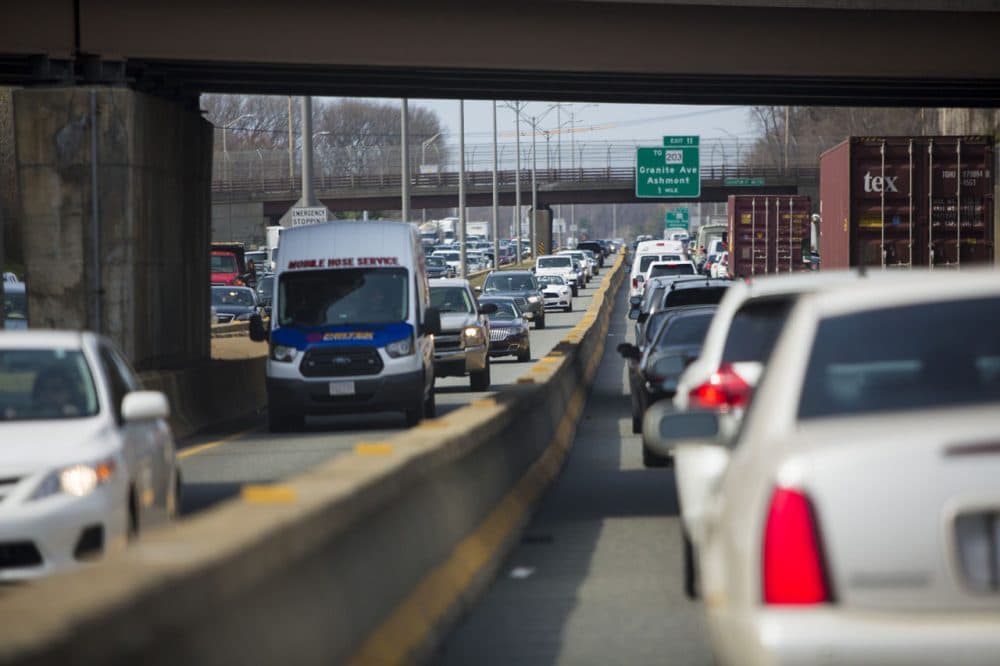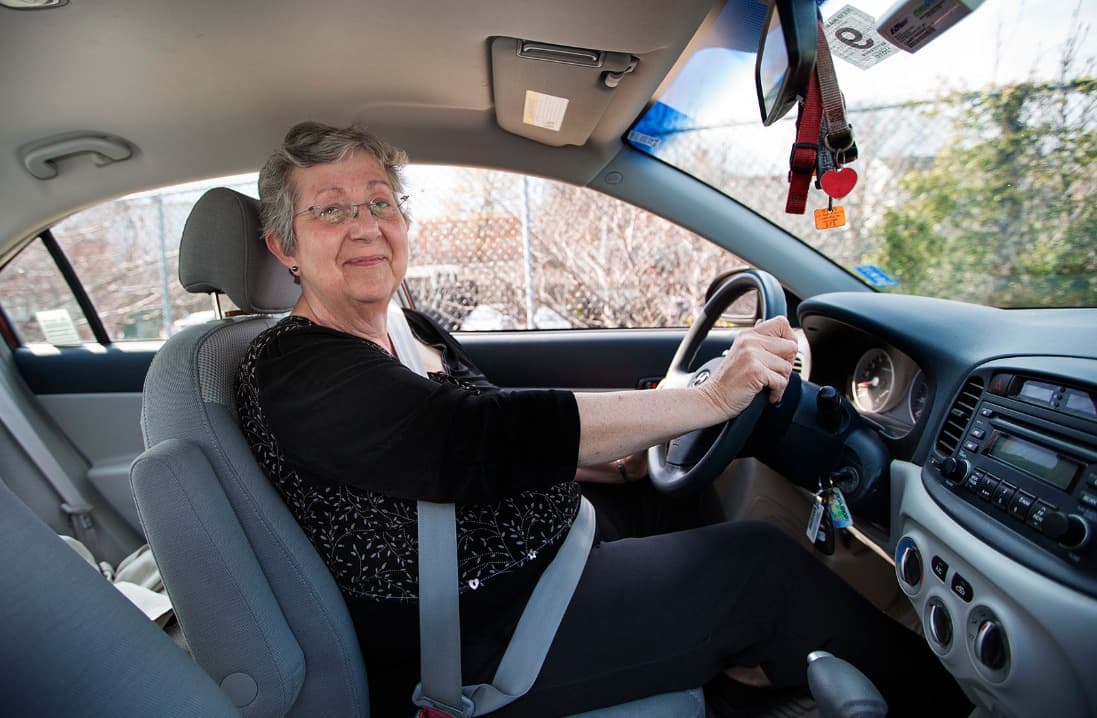Advertisement
Weight Gain, Heart Disease, Back Pain: Longer Car Commutes May Harm Your Health
Resume
Four years ago, Barbara Huntress-Rather got a great job, as director of quality improvement for a health care company that serves fragile seniors. Just one problem: She lived in Lawrence, and the new job was in Lynn.
"The first day I drove to work and said, ‘Oh, Lord, what have I done?’ " she recalls. "After having a short commute for quite a few years, I hadn’t done the commute before in rush hour traffic and I was absolutely stunned at how long it took — it was over an hour."
A harrowing hour, or more, hunched at the wheel, watching out constantly for aggressive or distracted drivers. In the months that followed, the effects on her health were dramatic: "I gained back 40 pounds that I had lost, developed low back pain and high blood pressure," she says.
Huntress-Rather didn't immediately blame her commute; she blamed herself for eating too much and feeling too tired to exercise. But she hit a turning point when her nurse practitioner told her she’d need blood pressure medication.
"I had always prided myself in being in good physical shape and meditating and doing all the things that would keep me from having high blood pressure," she says. "And I immediately made the connection between not working out, spending endless hours in the car and feeling totally stressed most of the time. I was either commuting or worrying about commuting."

Huntress-Rather is practically a textbook case of what longer car commutes can do to bodies and minds. The evidence has been mounting in study after study in recent years, adding up to strong reason to believe that the worsening traffic in Boston — or any metropolitan area — does not just cost drivers time. It may also cost them health.
Let’s begin with the No. 1 killer of Americans: heart disease.
"You potentially have a triple whammy, where you’re piling on different cardiovascular stressors all tied back to the same root cause, commuting," says Dr. Jonathan Levy, a professor of environmental health at the Boston University School of Public Health.
That triple whammy includes two effects of traffic that everybody already knows are bad for the heart: the stress, and the finding that people with longer commutes tend to exercise less.
The third piece is less obvious: "Air pollution has been tied to cardiovascular outcomes and sometimes acute outcomes — things like heart attacks," Levy says.
Yes, German researchers have found that people who are prone to heart attacks become much likelier to actually have one within an hour of being in heavy traffic. Why isn't exactly clear, but scientists say that air pollution appears to play a role — in particular, ultra-fine particulates, nano-sized airborne toxins whose levels tend to be highest around highways and in tunnels, especially in heavy traffic.
Professor Doug Brugge of Tufts Medical School, who studies particulates, says that though clean air laws have made heavy smog a thing of the past in the United States, these invisible, odorless particles are still a major health concern, particularly for people who live right near highways.
"Everyone thinks: air pollution — breathing in, lungs, respiratory disease," he says. "But the particles also affect your circulatory system. They drive inflammation. And the main health outcomes — the largest, most tangible health outcomes — are actually cardiovascular: heart attacks and strokes."
Tunnels — like Boston's I-93, put underground by the Big Dig — can be particular hotspots for this localized air pollution. Tufts University researchers have found that by the time a motorist reaches the end of the 93 tunnel, the level of air pollution particulates may be 10 times as high as it is on the highway a couple of miles away. Those two or three minutes in the tunnel are likely to expose you to a higher concentration of air pollution than any other part of your day.
Those two or three minutes in the I-93 tunnel are likely to expose you to a higher concentration of air pollution than any other part of your day.
But professor John Durant, who oversaw that Tufts research, offers three simple remedies: Roll up the windows, turn on the air conditioner, and close the vents that bring in outside air.
"Those three measures," he says, "will reduce exposures by a significant amount, by close to 90 to 95 percent."
If only it were so simple to offset the other health risks of long car commutes. Here's a sampling, from the last few years of research: Longer commutes may mean...
• more depression and anxiety;
• more social isolation;
• higher weight;
• lower life satisfaction and happiness;
• less sleep;
• less exercise, lower fitness;
• higher cholesterol;
• higher blood sugar;
• higher blood pressure;
• more back and neck aches.
• One Swedish study even found that people who commute more than 45 minutes each way are 40 percent likelier to get a divorce.
Most of these risks do not rise by very much, and many do have commonsense remedies — deep breathing and other stress relief techniques, for example, or conscious efforts to exercise more when not commuting.
And of course, the ultimate remedy is to drive less and switch to public transportation or "active commuting" — walking or biking. And for everyone to drive less.
But if you feel like you have to drive, you might want to do an informal, personal version of what’s called a Health Impact Assessment. That’s what Levy of BU and his team did in 2012, when the MBTA was planning service cuts and fare hikes aimed at saving about $160 million.
Levy's team calculated roughly what the cuts would cost in health and time if they made people drive more — everything from added air pollution to less exercise. Their conclusion: Trying to save $160 million could cost $300 or $400 million.
Our commuter, Huntress-Rather, did her own math and made a radical decision. She really likes her job, and had planned to work until she was 70. But instead, she’s taking a financial hit and planning to retire at just 65. She'll live near the beach, where she can take long walks. The last day of her long commute is coming very soon.
"May 25!" she says with an audible sigh of relief.
She decided that getting home so tired every day that all she can do is numb out by binge-watching brainless reruns is no way to live.
"I just felt like time was slipping away, and I wasn’t enjoying it," she says. "I don’t enjoy sitting in a car, not moving. I had to do it."
She's going to start working out again, she says, and get her good health back.
Tips For A Healthier Commute
It's become a whole little genre: headlines that warn, "Your commute is killing you!"
Dr. Edward Phillips, director of Harvard Medical School's Institute of Lifestyle Medicine, says he'd never say that to a patient. But he would tell them that longer car commutes are linked to higher weight and less happiness. "[And] I would tell them to take any other option for a more active commute, including walking, biking, use of mass transit."
1. Consider a 'hybrid commute'
"Even if you're saddled with a long car commute, look for maybe a hybrid commute," Phillips says. 'I'm not talking about driving a hybrid. I'm talking about combining driving with mass transit, or parking a little further from your office, maybe in a cheaper spot. Pick up some extra steps in the morning; and you've got to get back to your car in the afternoon.
"While you're at it, add some steps during the workday, break up that continuous sitting, and overcome the deleterious effects of a long commute."
2. Avoid air pollution
As professors Brugge and Durant explain above, air pollution particles tend to be found in particularly high concentrations in poorly ventilated tunnels and where traffic is high. Durant suggests three preventive measures for tunnels: Close the windows, turn off the vents and turn on the air conditioner.
His other tips: Buy a lighter car that burns less fuel, and hope everyone else does, too. Shorten your commute by driving at a less busy time, or take less crowded roadways (though that may add time.) Avoid spikes of air pollution exposure, such as in tunnels and at busy intersections.
3. Cut stress
Glaringly obvious but so seldom acted upon: If you leave earlier, the trip will be less stressful.
Otherwise, on the mind-body front, this MSNBC post headlined "5 ways to keep your commute from killing you" (See? It's a whole genre!) offers some tricks of emotional engineering to cope with the lovely gamut of daily commuting emotions, from rage to despair over lost time.
Some sound easier said than done, though. Like: "Reframe your thinking, and instead of letting anger over traffic or aggressive drivers make you act the same way, use this 'downtime' in a positive, productive way."
Bottom line: Fill your commuting time with good content (preferably from your favorite purveyor of public radio, of course.)
4. The new smoking?
Confession: I knew commuting was often tedious or stressful, but I'm struck by the multitude of health harms that researchers have found. In many cases a longish commute adds only a few percentage points to your risk; for example, a Gallup poll found that 20 percent of people who commute under 10 minutes have high cholesterol, compared with 27 percent of people who commute over 90 minutes. Among those super-short commuters, 24 percent were obese, compared with 30 percent of super-long commuters.
But across the many aspects of mental and physical health affected by commuting, the percentage points add up. Raising the question: Should we see long commuting as a health risk a little like smoking? It's surely not as harmful, but if "sitting is the new smoking," couldn't commuting be as well? And could awareness of those risks help spur even healthier behavior while not in the car?
5. Big picture: Try everything
Ask experts for tips on what you can do at the individual level and the discussion inevitably expands to the big picture.
Brugge of Tufts says that health-conscious commuters might want to support advocacy for more and better public transportation and "active transportation" — biking and walking.
The air pollution from vehicles, he says, is a public health problem on a par with obesity and smoking, "the other major public health problems of our time — but somehow it is not as well recognized," though it's estimated to lead to 100,000 American deaths per year.
"I think you have to pursue an issue like this from every direction you can," he says. "You can encourage public transportation and active transportation. You can encourage cars that are cleaner. You can encourage — as in Somerville — protection in buildings near highways that reduces exposure inside buildings. Even at a very individual level, you can roll up windows and turn off the outside air vents in your car as you go through a tunnel and when you're in heavy traffic.
"I don't think you privilege one of those things and say, 'This is it.' I think you pursue all of them and over time, you hope some of them --like cleaner vehicles and better public transportation — make some progress. And enough of them make progress that there's substantial change."
Readers, reactions? Tips? Did health effects persuade you to change your commute?
